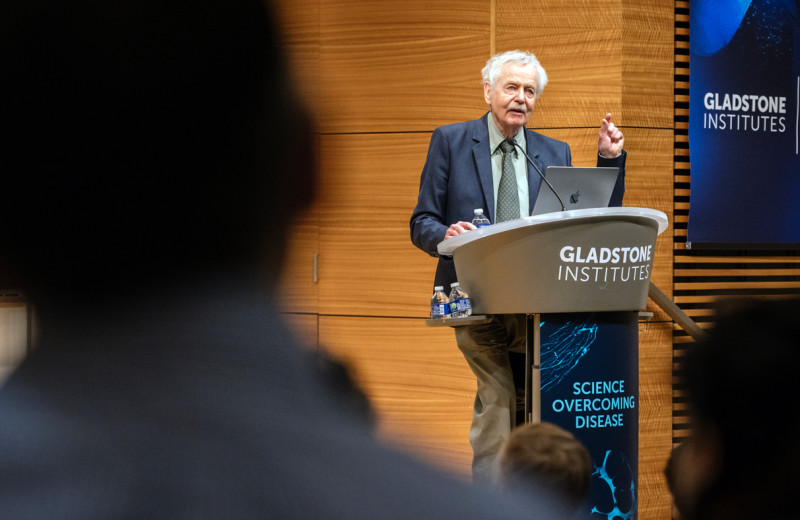Gladstone NOW: The Campaign Join Us on the Journey✕

SAN FRANCISCO, CA—February 18, 2010—Lennart Mucke, MD, Director of the Gladstone Institute of Neurological Disease (GIND), has been named a recipient of the American Academy of Neurology's prestigious Potamkin Prize. Mucke is recognized for the development of experimental strategies to make the brain more resistant against Alzheimer's disease and for instigating a turnaround in the direction of research in this field. Mucke and his co-recipient Bruce Miller, MD, UCSF professor of neurology and psychiatry, will be presented with the prize for research in Pick's, Alzheimer's and related diseases on April 15.
Our ability to think, remember and control our lives depends on finely balanced activities in complex neural networks in our brains. Alzheimer's disease erodes and destabilizes these networks, setting in motion vicious cycles of abnormal neuronal activity resulting in cognitive deficits and neurodegeneration. Mucke and colleagues discovered strategies that effectively prevent and even reverse abnormal network activity and cognitive impairments in mouse models of the disease. Remarkably, the same strategies also increased resistance to epileptic seizures, suggesting that they could be of broad therapeutic benefit.
Most treatments for dementing disorders currently under development aim to block the buildup of poisonous proteins in the brain, but the long-term efficacy and safety of these approaches remains unknown. The strategies Mucke discovered could complement these approaches by making the brain more resistant to these abnormal proteins and to other disease processes causing abnormal neuronal activities.
Ten years ago, many scientists believed the dementia of Alzheimer's disease was caused by the accumulation of amyloid plaques in the brain. Mucke and colleagues showed that a minuscule constituent of these plaques, known as amyloid-beta peptide, can impair the function of brain cells independent of plaques, thus narrowing the whereabouts of the disease culprit from the “haystack” to the “needle.”
Miller is the clinical director of UCSF's Memory and Aging Center and has a special interest in the behavioral effects of dementia, notably frontotemporal lobar degeneration (FTLD), which used to be more commonly known as Pick's disease. Along with Alzheimer's disease, FTLD is the leading cause of dementia in patients under 65 years. Thanks in part to the pioneering work of Miller and his colleagues, the condition is gaining significantly wider prominence and neurologists are now able to distinguish it from Alzheimer's in its earlier stage.
According to Mucke, the Potamkin award is “a wonderful reinforcement of the synergism” between himself and Miller. “Working together, we have developed innovative translational programs for the investigation and treatment of dementia and related disorders.” Miller concurs and describes the Potamkin Prize as the highlight of his academic career.
Lennart Mucke's primary affiliation is with the Gladstone Institute of Neurological Disease, where he is director/senior investigator and where his laboratory is located and his research is conducted. He is also the Joseph B. Martin Distinguished Professor of Neuroscience at UCSF.
About the Gladstone Institutes
The Gladstone Institutes is a nonprofit, independent research and educational institution, consisting of the Gladstone Institute of Cardiovascular Disease, the Gladstone Institute of Virology and Immunology, and the Gladstone Institute of Neurological Disease. Independent in its governance, finances and research programs, Gladstone shares a close affiliation with UCSF through its faculty, who hold joint UCSF appointments.
Support Discovery Science
Your gift to Gladstone will allow our researchers to pursue high-quality science, focus on disease, and train the next generation of scientific thought leaders.
A Sculptor of Modern Regenerative Medicine
A Sculptor of Modern Regenerative Medicine
Among his myriad accomplishments, Rudolf Jaenisch—winner of the 2025 Ogawa-Yamanaka Stem Cell Prize—was the first to demonstrate the potential of induced pluripotent stem cells to treat disease.
Awards Ogawa Stem Cell Prize Profile Regenerative Medicine Stem Cells/iPSCsSix Gladstone Scientists Named Among World’s Most Highly Cited Researchers
Six Gladstone Scientists Named Among World’s Most Highly Cited Researchers
The featured scientists include global leaders in gene editing, data science, and immunology.
Awards News Release Corces Lab Doudna Lab Marson Lab Pollard Lab Ye LabBringing Modern Science to Vitamin Biology: Isha Jain Wins NIH Transformative Research Award
Bringing Modern Science to Vitamin Biology: Isha Jain Wins NIH Transformative Research Award
Leveraging modern scientific tools and techniques, Jain intends to transform our understanding of the critical roles that vitamins play in health and disease.
Awards News Release Cardiovascular Disease Jain Lab Metabolism



